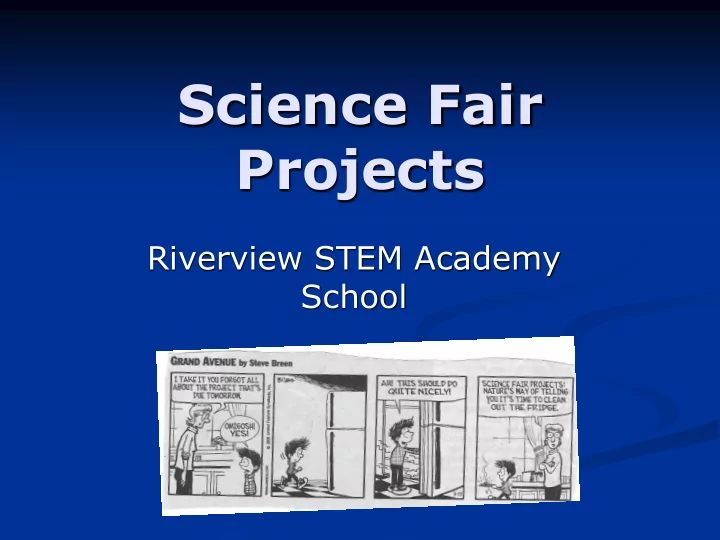

Science Fair Projects Riverview STEM Academy School
Scientific Method Question: Ask a question that can be answered by performing an experiment. Research: Do some background research so you have some basis for making a hypothesis. Hypothesis: Make an educated guess about what you think will happen and why. Procedure: Set up a way to test your hypothesis. Results: Describe what happened with data. Conclusion: State whether your hypothesis was correct or incorrect. Try to explain why you got the result you did.
Avoid Building a Model A science project involves asking a question and then figuring out how to answer it by designing a test. It does NOT involve building a model or demonstrating how something works. Example: growing crystals By itself, that ’ s building a model. BUT - growing half the crystals in tap water and half in another liquid and then comparing the results makes it a science project.
Take It Step By Step Find something that interests you and ask a testable question about it. Do some research to learn more about your topic. Based on your research, make a hypothesis that states what you think will happen and why. Design a procedure to test your hypothesis.
For Example… Does temperature affect plant growth? Read about plant growth in a science book or on the internet. Hypothesis: I think temperature will affect plant growth because plants need sun to grow and the fact that the sun sends out heat makes me think that plants need to be warm to grow. I will test this by putting 3 plants in 3 different temperature situations – 1 that is cold, 1 that is heated, and 1 that is room temperature.
Identifying Variables Independent variable The thing you purposefully change Dependent variable The thing that is being observed – it changes in response to the independent variable Controlled variables Those things that remain constant and don ’ t change
For example… Will mold grow on bread if there is no light? Light is the independent variable – it is changing Mold is the dependent variable – it ’ s what ’ s being observed Controlled variables : type of bread and temperature – these have to be the same
Another Example… Which airplane design will fly farthest? Plane design is the independent variable – it ’ s changing Distance is the dependent variable – it ’ s what ’ s being observed Controlled variables : type of paper used, wind, amount of thrust
Be Sure to Collect Data Scientists love data! Show your data in charts, tables, and/or graphs Example: Plant growth experiments Measure at regular intervals (e.g., daily at the same time) Record the measurements every time (make a chart before you start and leave it by the plants)
Project Notes Everything should be recorded on paper The steps taken Materials used Measurements including dates and times Observations Students should take notes when they do research to explain their results Display the project notes with the project
Examples of Project Notes
When Data Seems Hard to Get Example: Comparing paper airplane flights Perform several trials and record the distance for each – chart all the data Then figure out the average distance Example: Comparing rates of mold growth Record the time, write down your observation, draw or take a picture of what you see each time Observations and pictures are still data
The Display THIS IS THE LAST STEP! It should be eye-catching and colorful, but not distracting. It should be neat and show pride of workmanship. It should include all the steps of the Scientific Method in a logical order. It should clearly communicate all the information about the investigation. It should be easy to read, words should be spelled correctly, and rules of grammar should be followed.
Project Samples Set up your actual experiment… …or have pictures on the board that show what you did.
Recommend
More recommend